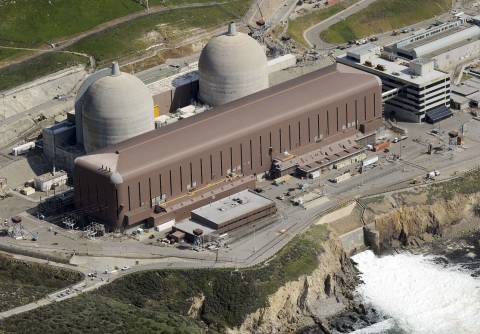(Bloomberg) -- A bill that could keep California’s last nuclear plant open as the state transitions from fossil fuels was finally introduced late Sunday in Sacramento and now faces a difficult path to passage, as Governor Gavin Newsom tries to rally support before the current legislative session ends on Aug. 31.

Newsom has talked since April about keeping PG&E Corp.’s Diablo Canyon nuclear plant running past its planned closure in 2025. Its steady output, the Democrat argued, will be needed to prevent blackouts as more gas-burning power plants close and renewable facilities are built to replace them.

But Newsom waited until the legislative session’s final weeks to put forward a detailed proposal, angering Democrats who were already reluctant to grant Diablo Canyon a reprieve.
The bill represents a compromise with legislators. It would extend the plant’s operations by just five years, without the option of a second extension. It would give PG&E a loan of up to $1.4 billion to help run the plant, but the loan would be conditioned upon the company receiving money from the federal government to pay the state back. The money couldn’t be given to PG&E shareholders as profit. And if state energy regulators decide Diablo Canyon’s power isn’t needed to keep the lights on after all, the loan would be terminated.
PG&E shares were little changed Monday, rising 0.3% to $12.52.
Even if the legislature approves the bill before its September recess, PG&E will have little time in which to relicense the plant. The existing federal licenses for its two reactors expire in 2024 and 2025, respectively, and the process for extending such licenses often takes years.
Still, the bill’s introduction marks a reversal in a state that has long viewed nuclear power with suspicion. Environmentalists fought for decades to shutter Diablo Canyon, which sits on a coastal bluff between Los Angeles and San Francisco and is surrounded by earthquake faults.
But the prospect of looming power shortages has the Golden State rethinking its position on shutting down its single largest carbon-free source of electricity. Rolling blackouts struck California during heat waves in 2020, an experience Newsom -- who is running for re-election in November and has been viewed as a potential presidential candidate -- doesn’t want to see repeated.
Read more: California, long leery of nuclear power, joins bid to save it
PG&E struck an agreement in 2016 with the state, labor unions and environmental groups to retire the reactors at Diablo Canyon when their federal operating licenses expire. The decision came in the wake of the 2011 Fukushima disaster in Japan that was triggered by an earthquake and tsunami, raising new concerns about the safety of nuclear power.
A number of environmental groups have called for the state to stick to its decision to retire the plant. Critics say extending the life of Diablo Canyon wouldn’t be safe without expensive seismic and environmental upgrades. At the same time, a group of scientists and energy officials -- including two former secretaries of the US Department of Energy -- advocated to keep the plant open.
(Updates with bill details in the fourth paragraph.)
More stories like this are available on bloomberg.com
©2022 Bloomberg L.P.
Author: David R. Baker and Mark Chediak
